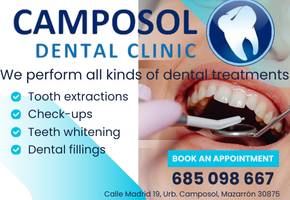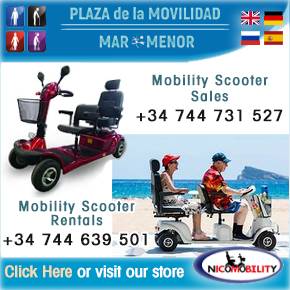

Guidelines for submitting articles to Roda Golf Resort Today
Hello, and thank you for choosing La Torre Today.com to publicise your organisation’s info or event.
Roda Golf Resort Today is a website set up by Murcia Today specifically for residents of the urbanisation in Southwest Murcia, providing news and information on what’s happening in the local area, which is the largest English-speaking expat area in the Region of Murcia.
When submitting text to be included on Roda Golf Resort Today, please abide by the following guidelines so we can upload your article as swiftly as possible:
Send an email to editor@spaintodayonline.com or contact@murciatoday.com
Attach the information in a Word Document or Google Doc
Include all relevant points, including:
Who is the organisation running the event?
Where is it happening?
When?
How much does it cost?
Is it necessary to book beforehand, or can people just show up on the day?
…but try not to exceed 300 words
Also attach a photo to illustrate your article, no more than 100kb

How to register the birth of a baby in Spain
This procedure changes on October 15th 2015
At present the process of registering the birth of a baby in Spain is as follows, although the procedures are  due to be simplified for hospital births as of 15th October 2015:
due to be simplified for hospital births as of 15th October 2015:
The details included in the registration of a birthinclude the following:
- The baby’s full name and gender
- The date, time and place of birth
- The full names and details of both parents (when both accept legal responsibility for the child)
- The registration number assigned to the birth
- The time and date of registration
When can a baby be registered?
At present births must be registered within 8 days, according to the Ministry of Justice website
(https://www.mjusticia.gob.es/cs/Satellite/Portal/en/servicios-ciudadano/tramites-gestiones-personales/inscripcion-nacimiento), although this period can be extended to 30 days if a valid reason is provided for doing so. The procedures for registering a birth are slightly different depending on whether or not the parents are married.
If the parents are marriedit is only necessary for one of them to go to the Registro Civil which corresponds to the place where they live (where they are registered on the “padrón”), or where the baby was born.
To find this address, google Registro Civíl and the name of your local town, or ask at your local Town Hall.
The documentation needed is the following:
- The “parte médico de alumbramiento” (medical delivery report): this is a yellow document which is supplied either by the hospital where the baby is born or by the midwife or other medical staff in the case of births which take place outside hospital.
- The identity documents of both parents.
- The Libro de Familia which is issued when marriages are registered in Spain.
- Residency documents for those who are not Spanish nationals.
In the case of parents who were not married in Spain, and therefore do not have a Libro de Familia, a marriage certificate must be shown.
Although the obligation to register a birth lies first with the parents, in cases where this is not possible it is permissible for grandparents, aunts, uncles, cousins and even brothers- and sisters-in-law of the newborn to register a birth, although these cases are rare.
If the parents are not married, then either the mother can register the birth, excluding the father from all family responsibilities and eliminating his surname, or it is necessary for both parents to go to the registry office together.
The documents to be supplied in this case are the following:
- The “parte médico de alumbramiento” (see above).
- The identity documents of both parents.
- Indication of the mother’s marital status.
- If either parent has been married in the past, documentation proving that marriage and, where appropriate, the legal confirmation of divorce or separation. If a previous marriage has not ended in legal separation or divorce but a “de facto” separation exists, then two witnesses attesting to this must also attend the registry office.
As of 15th October the process is to be simplified considerably by the introduction of new procedures which will allow hospital staff to register births online. This removes the need for what can be a long visit to the registry office: at the moment it’s common in some places to see proud new parents queuing outside registry offices from 8.00 in the morning and waiting for them to open at 9.00 in order to avoid an even longer wait later in the day.
As of October 2015 the hospital staff will have to inform the registry office of births within 72 hours, and take the baby’s footprints and fingerprints. The delivery report issued by the hospital will be digitally signed and all of the information will be sent electronically to the registry office.
These procedures may seem complex, but in fact the best advice regarding how to register a new-born baby in Spain, at least for those whose children are born in hospital, is simple: follow the instructions given by hospital staff. If you don’t understand fully, ASK, and then if necessary ASK AGAIN until you are sure. The last thing any new parent wants is to have to go to the registry office twice, or to fail to register their child!
Names
The issue of names is no longer as controversial as it was in the past, when unusual, unconventional and foreign names were often not admitted by registry offices in Spain. Few first names are actually banned – curiously, Hitler is among them, although Stalin is permitted – and non-Spanish names or spellings are freely admitted. The only restrictions imposed by the Ministry of Justice are that names should not be potentially harmful for the baby, should not be confusing, and should not induce mistaken assumptions about the gender of the baby.
If foreigners have acquired Spanish nationality then their children will be assigned two surnames, as established by Spanish law. If, however, they have not become Spanish nationals, then the customs of their own countries will be respected.
Padrón
Having registered the birth of your baby, he or she should also be inscribed on the local census at the Town Halls Padrón office.
Health service registration
Once the baby is inscribed at the Padrón office it is possible to register the baby with Social Security as your beneficiary. For this its necessary to go to the local branch of the Instituto Nacional de Seguridad Social (INSS) and present the Libro de Familia, the birth registration details, the certificate of registration on the Padrón, the health card of the parents and your ID document.
This Social Security registration now enables you to register your baby at your local health centre, where a paediatrician will be assigned and after a few days the newborns health card should be ready to pick up.
For other info to help you deal with common issues in Spain go to the index of Ex-pat fact sheets
















